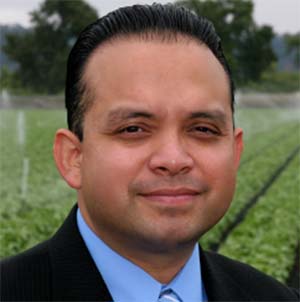Assemblyman Luis Alejo, author of a bill hitting the Assembly floor this week proposing to increase the state’s minimum wage, said the legislation would assist lower-income families in keeping up with escalating costs and that it would dissuade municipalities from passing local rates.
Alejo’s third attempt to adjust California’s minimum wage would not only increase the figure from $8 to $9.25 over a three-year period, but it would also attach the number to a cost-of-living index that would fluctuate from year to year.
This is the first time Alejo’s minimum wage bill has passed through the committee level – he attributed its lack of movement in past sessions to “timing” – and it will be heard on the Assembly floor by Friday, he said.
The Watsonville Democrat who represents San Benito County and Southern Santa Clara County underscored that Californians are seeing increases in the price of food, clothing and rent – but that the state’s minimum wage has not kept pace.
“That makes it much harder for our lower-income families to get by,” Alejo said, underscoring the state has not increased the minimum wage since 2008.
At least one local opponent, Robert Bernosky, Alejo’s adversary in the 2012 election and now chairman of the San Benito County GOP, is particularly concerned about the inflation index proposal in the bill.
“Entry-level jobs are exactly that – entry-level jobs,” Bernosky said. “This bill will keep people at minimum wage for the rest of their lives. We want people to grow out of minimum-wage jobs. We want them to get skills in those minimum-wage jobs and then be able to get higher-paying jobs.”
Bernosky in pinpointing the inflation attachment acknowledged that merely increasing the wage is “not so troublesome.”
While Bernosky is speaking out locally, there has been debate on the state level as well.
Writing in support for a committee-level analysis on the bill, the California Labor Federation argued the change would “strengthen and depoliticize California’s minimum wage.”
“In support of this,” the organization wrote for the analysis, “CLF cites that the California Budget Project has calculated that between 1968 and 2008, the purchasing power of California’s minimum wage fell 24.8%.”
In opposition, the California Chamber of Commerce called the bill a “job killer.”
“The Chamber states that California’s economic recovery is still in the infancy stage and that an increase in the minimum wage in 2014 will negatively impact any economic recovery by either limiting available jobs, or worse, creating further job loss,” according to the document.
As one of his own selling points, Alejo contended there has been “no evidence of adverse impacts” in other states – such as Nevada, Oregon and Washington – which are attaching the minimum wage to an inflationary index. Nationwide, 19 states have minimum wages exceeding the federal rate, according to the U.S. Department of Labor, while President Obama has proposed a federal minimum wage of $9.
There is variation from state to state, but some local jurisdictions in California also have considered minimum wages above the state rate. Alejo pointed to San Francisco, with a rate of $10.55, as an example of a city compelled to approve its own minimum wage to eclipse the state number, along with San Jose and its $10 rate.
Despite disagreeing with critics about the negative economic impact, Alejo said he is continuing to work with businesses and business organizations on the bill and that it could change as it works through the legislative process.










